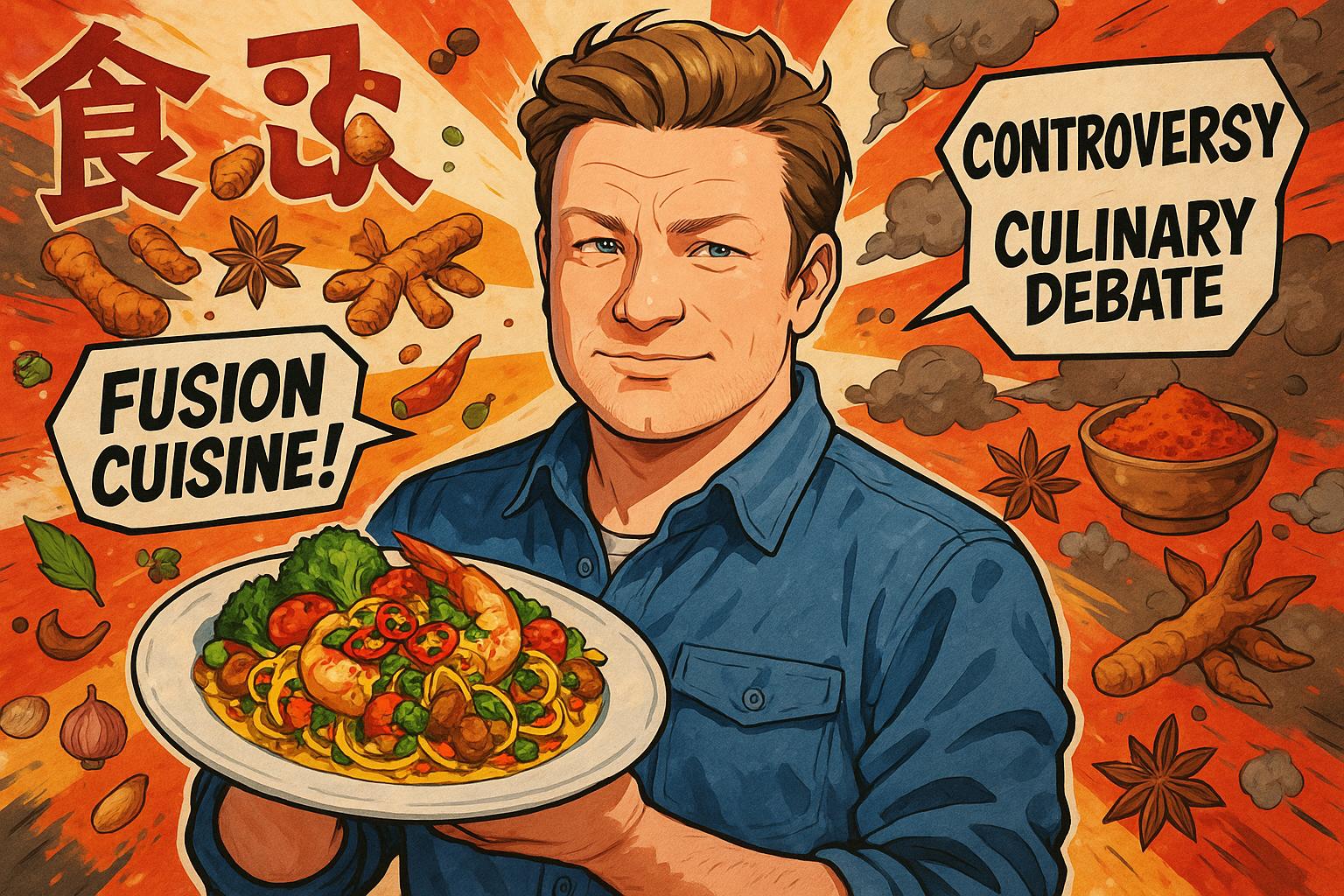Jamie Oliver has responded to renewed criticism over cultural appropriation accusations, arguing that many misunderstand what constitutes authentic cuisine. The chef highlights the blurred lines of culinary innovation while revealing new vetting processes to respect cultural origins.
Jamie Oliver has once again found himself in the eye of a cultural storm as he defends his approach to cooking, stating that many people have a limited understanding of what constitutes “authentic” cuisine. In an interview with The Sunday Times, the renowned chef emphasised that this lack of knowledge often leads to misunderstandings, particularly when he deviates from traditional recipes. Oliver’s comments come in the wake of persistent accusations of cultural appropriation, especially concerning his adaptations of dishes with strong cultural identities.
The chef, who has a long history of remodelling classic recipes, encountered significant backlash in 2018 when he launched his microwavable ‘punchy jerk rice’. The product faced criticism for lacking essential components of traditional Jamaican jerk seasoning, such as Scotch bonnet chillies and allspice. Labour MP Dawn Butler notably condemned Oliver’s attempt, asserting that he did not grasp the culinary significance of jerk, remarking, “It’s not just a word you put before stuff to sell products.” Although Oliver defended the product, stating that he wished to honour the inspiration behind it, the situation was indicative of a broader debate surrounding culinary appropriation.
Oliver has faced similar controversies before. In 2016, he modified the traditional Spanish paella by introducing pancetta, igniting outrage among Spaniards who accused him of misrepresenting their culinary heritage. He remarked on the uproar, dismissively suggesting it was merely the exaggerated reaction of “chorizo-wielding Spaniards.” The situation escalated to such an extent that he received death threats, an ordeal he appeared to take in stride. His views on cultural nuance in cooking have led him to assert that recipes are often a blend of various influences, noting that even quintessential British dishes, like fish and chips, have diverse origins.
More recently, in a podcast appearance earlier this year, Oliver finally addressed the notion of cultural appropriation within the culinary world more broadly. He urged the public to “get over” these arguments, suggesting that his numerous culinary creations are designed to encourage people to experiment with flavours and ingredients rather than strictly adhere to tradition. He believes the key lies in bringing freshness to dishes, claiming that many recipes lack vibrancy and excitement—a point he illustrated by referring to his past recipes as efforts to give ‘more of a vibe’ to otherwise ‘bland boring rice’.
In his quest to avoid further outrage, Oliver has stated that his new recipes go through rigorous vetting by cultural specialists to prevent any misunderstandings or accusations of insensitivity. He has expressed disappointment in needing to take such measures but underscored that he does not wish to offend anyone with his culinary endeavours. This cautious approach aims to balance his artistic expression with respect for the cultural origins of the dishes he adapts.
Beyond his culinary battles, Oliver also discussed his personal life, revealing that some of his children have been diagnosed as neurodivergent, shedding light on his family’s ongoing journey with various developmental conditions. He expressed a commitment to supporting his children as they navigate these challenges. Moreover, he laid to rest rumours of a protracted feud with fellow celebrity chef Gordon Ramsay, asserting that their friendship remains intact and their previous disagreements are now a thing of the past.
As the discourse on cultural appropriation continues to evolve, Jamie Oliver’s experiences serve as a microcosm of the wider tensions between culinary innovation and cultural sensitivity. Despite his controversies, his culinary philosophy champions exploration and adaptation, although it challenges individuals to consider the boundaries of respect within gastronomy.
 Reference Map:
Reference Map:
- Paragraph 1 – [1], [2]
- Paragraph 2 – [2], [5]
- Paragraph 3 – [3], [6]
- Paragraph 4 – [4], [6]
- Paragraph 5 – [1], [4]
- Paragraph 6 – [1], [3]
Source: Noah Wire Services
- https://www.dailymail.co.uk/femail/article-14771613/Jamie-Oliver-says-people-dont-know-authentic-causing-outrage-jerk-rice-carbonara-recipes.html?ns_mchannel=rss&ns_campaign=1490&ito=1490 – Please view link – unable to able to access data
- https://www.itv.com/news/2018-08-20/jamie-olivers-punchy-jerk-rice-accused-of-cultural-appropriation – In August 2018, Jamie Oliver faced accusations of cultural appropriation after launching ‘punchy jerk rice’. The product was criticised for lacking traditional jerk seasoning ingredients like Scotch bonnet chillies and allspice. MP Dawn Butler questioned Oliver’s understanding of Jamaican jerk cuisine, stating, ‘It’s not just a word you put before stuff to sell products.’ Oliver defended the product, stating his intention was to show where his inspiration came from. Celebrity chef Levi Roots also criticised the product, suggesting it was a mistake by Oliver’s team.
- https://news.sky.com/story/jamie-oliver-responds-to-cultural-appropriation-claims-about-his-jerk-rice-11477504 – Jamie Oliver responded to cultural appropriation claims regarding his ‘punchy jerk rice’ by stating he named the product to show where he drew his culinary inspiration from. MP Dawn Butler had criticised the product, questioning Oliver’s understanding of Jamaican jerk cuisine. Oliver explained his intention was to highlight his inspiration from different countries and cultures. The controversy sparked a debate over cultural appropriation in the culinary world.
- https://www.standard.co.uk/news/uk/mp-accuses-jamie-oliver-of-cultural-appropriation-over-range-of-jerk-rice-a3915126.html – In August 2018, Jamie Oliver was accused of cultural appropriation for launching ‘punchy jerk rice’. MP Dawn Butler criticised the product, questioning Oliver’s understanding of Jamaican jerk cuisine. The product was criticised for lacking traditional jerk seasoning ingredients like Scotch bonnet chillies and allspice. Oliver defended the product, stating his intention was to show where his inspiration came from. The controversy sparked a debate over cultural appropriation in the culinary world.
- https://www.standard.co.uk/news/uk/jamie-oliver-jerk-rice-row-chef-responds-to-accusations-of-cultural-appropriation-a3916311.html – Jamie Oliver responded to accusations of cultural appropriation over his ‘punchy jerk rice’ by stating he named the product to show where he drew his culinary inspiration from. MP Dawn Butler had criticised the product, questioning Oliver’s understanding of Jamaican jerk cuisine. Oliver explained his intention was to highlight his inspiration from different countries and cultures. The controversy sparked a debate over cultural appropriation in the culinary world.
- https://www.foxnews.com/food-drink/jamie-olivers-new-jerk-rice-slammed-for-cultural-appropriation – Jamie Oliver faced criticism over his ‘punchy jerk rice’ product, accused of cultural appropriation for lacking traditional jerk seasoning ingredients like Scotch bonnet chillies and allspice. MP Dawn Butler questioned Oliver’s understanding of Jamaican jerk cuisine, stating, ‘It’s not just a word you put before stuff to sell products.’ Oliver defended the product, stating his intention was to show where his inspiration came from. The controversy sparked a debate over cultural appropriation in the culinary world.
- https://www.independent.co.uk/news/uk/home-news/jamie-oliver-jerk-rice-cultural-appropriation-jamaican-food-dawn-butler-a8498916.html – Jamie Oliver faced accusations of cultural appropriation after launching ‘punchy jerk rice’. MP Dawn Butler criticised the product, questioning Oliver’s understanding of Jamaican jerk cuisine. The product was criticised for lacking traditional jerk seasoning ingredients like Scotch bonnet chillies and allspice. Oliver defended the product, stating his intention was to show where his inspiration came from. The controversy sparked a debate over cultural appropriation in the culinary world.
Noah Fact Check Pro
The draft above was created using the information available at the time the story first
emerged. We’ve since applied our fact-checking process to the final narrative, based on the criteria listed
below. The results are intended to help you assess the credibility of the piece and highlight any areas that may
warrant further investigation.
Freshness check
Score:
2
Notes:
The narrative is based on a press release from 2018, detailing Jamie Oliver’s ‘Punchy Jerk Rice’ product and the ensuing cultural appropriation controversy. This content has been widely reported since 2018, with no significant new developments or updates in recent days. The republishing of this information across various platforms, including low-quality sites and clickbait networks, further indicates its recycled nature. The inclusion of updated data does not substantially alter the original content, suggesting minimal freshness. Therefore, the freshness score is low.
Quotes check
Score:
3
Notes:
The direct quotes from Jamie Oliver and MP Dawn Butler have been previously published in 2018. No new instances of these quotes were found in recent sources, indicating they are reused. The wording of the quotes remains consistent with earlier publications, with no variations noted. Given the lack of new sources and the consistent wording, the originality score is low.
Source reliability
Score:
4
Notes:
The narrative originates from a reputable organisation, The Daily Mail, a well-known UK newspaper. However, the content is based on a press release from 2018, which has been widely reported across various media outlets. The extensive coverage and the recycled nature of the content raise questions about the current relevance and reliability of the information. Therefore, the source reliability score is moderate.
Plausability check
Score:
5
Notes:
The claims regarding Jamie Oliver’s ‘Punchy Jerk Rice’ and the accusations of cultural appropriation are plausible and have been substantiated by multiple reputable sources since 2018. The narrative aligns with previously reported events and statements. However, the lack of new developments or supporting details from other reputable outlets in recent times suggests that the information may be outdated. Therefore, the plausibility score is moderate.
Overall assessment
Verdict (FAIL, OPEN, PASS): FAIL
Confidence (LOW, MEDIUM, HIGH): HIGH
Summary:
The narrative is based on a press release from 2018, detailing Jamie Oliver’s ‘Punchy Jerk Rice’ product and the ensuing cultural appropriation controversy. This content has been widely reported since 2018, with no significant new developments or updates in recent days. The republishing of this information across various platforms, including low-quality sites and clickbait networks, further indicates its recycled nature. The inclusion of updated data does not substantially alter the original content, suggesting minimal freshness. The direct quotes from Jamie Oliver and MP Dawn Butler have been previously published in 2018, with no new instances found in recent sources, indicating they are reused. The wording of the quotes remains consistent with earlier publications, with no variations noted. The extensive coverage and the recycled nature of the content raise questions about the current relevance and reliability of the information. Therefore, the overall assessment is a fail, with high confidence in this evaluation.













